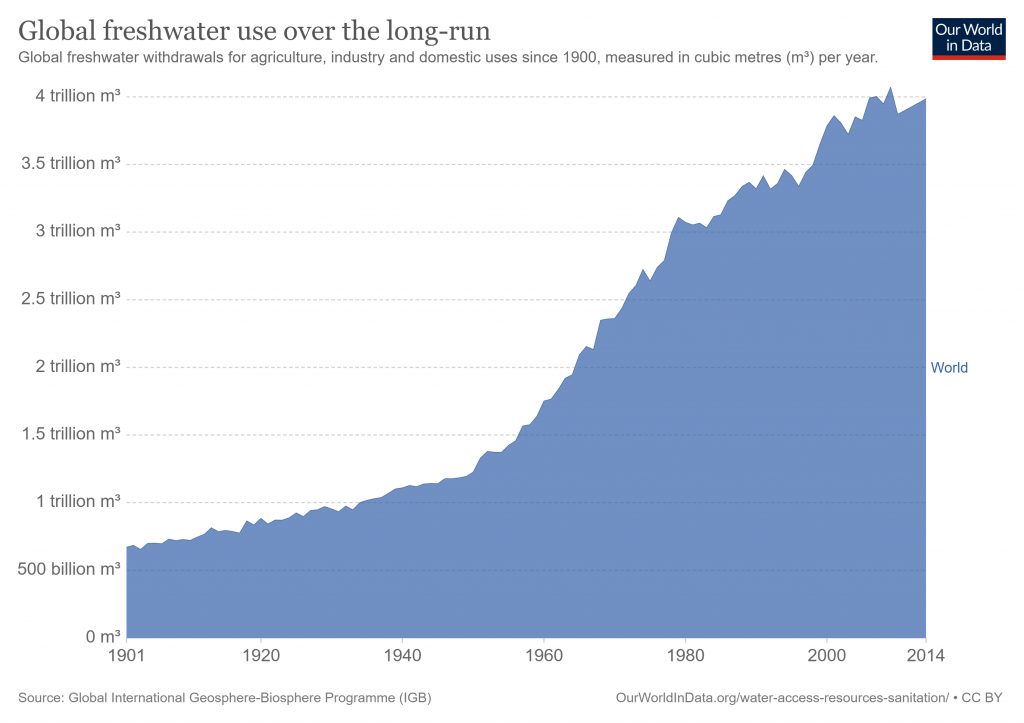Is Taking Long Showers Bad for the Environment?
Impactful Ninja is reader-supported. When you buy through links on our site, we may earn an affiliate commission.
Learn more
Learn more
.
Hey fellow impactful ninja ? You may have noticed that Impactful Ninja is all about providing helpful information to make a positive impact on the world and society. And that we love to link back to where we found all the information for each of our posts. Most of these links are informational-based for you to check out their primary sources with one click. But some of these links are so-called "affiliate links" to products that we recommend. First and foremost, because we believe that they add value to you. For example, when we wrote a post about the environmental impact of long showers, we came across an EPA recommendation to use WaterSense showerheads. So we linked to where you can find them. Or, for many of our posts, we also link to our favorite books on that topic so that you can get a much more holistic overview than one single blog post could provide. And when there is an affiliate program for these products, we sign up for it. For example, as Amazon Associates, we earn from qualifying purchases. First, and most importantly, we still only recommend products that we believe add value for you. When you buy something through one of our affiliate links, we may earn a small commission - but at no additional costs to you. And when you buy something through a link that is not an affiliate link, we won’t receive any commission but we’ll still be happy to have helped you. When we find products that we believe add value to you and the seller has an affiliate program, we sign up for it. When you buy something through one of our affiliate links, we may earn a small commission (at no extra costs to you). And at this point in time, all money is reinvested in sharing the most helpful content with you. This includes all operating costs for running this site and the content creation itself. You may have noticed by the way Impactful Ninja is operated that money is not the driving factor behind it. It is a passion project of mine and I love to share helpful information with you to make a positive impact on the world and society. However, it's a project in that I invest a lot of time and also quite some money. Eventually, my dream is to one day turn this passion project into my full-time job and provide even more helpful information. But that's still a long time to go. Stay impactful,Affiliate Disclosure
Why do we add these product links?
What do these affiliate links mean for you?
What do these affiliate links mean for us?
What does this mean for me personally?
![]()
Nothing beats a long, hot shower at the end of a long day. But did you know that the water and energy used during a long shower can have devastating effects on the environment? So we had to ask: Why is taking long showers bad for the environment?
Taking long showers is bad for the environment because of excessive water and energy consumption. Each gallon of water used contributes to the depletion and pollution of groundwater tables. And the energy needed for transmission and heating additionally increases greenhouse gas emissions.
By using less water you can protect the environment AND save energy. Keep reading to learn how the water and energy consumption of long showers impact the environment and how you can shower more environmentally friendly.
(Long) Showers Are a Major Contributor to the Increase in Global Water Consumption
About 71% of the earth’s surface is covered in water. Now, this may seem like a lot, but less than 1% is available for human consumption. The rest is either saltwater, locked in polar ice caps, or too inaccessible to extract. Because there is a relatively small amount of usable water on Earth, we must be careful regarding how much water we use and what we use it for.
Since the turn of the 20th century, global freshwater use for agricultural, industrial, and domestic purposes has drastically increased.

Showering falls under the domestic category, and it is just one of the subcategories where we consume a large quantity of water. Approximately 1.2 trillion gallons of water are used each year in the United States just for showering purposes, and showering takes up about 17% of residential water usage.
Here’s How Long Showers Impact the Environment
Examining both the water and energy consumption of long showers leads to the discovery that both can negatively impact the environment. Understanding the level of impact is crucial in the long-term preservation of the environment.
| Why is that bad for the environment? | |
| Long showers and water consumption | Long showers deplete the water in rivers, bays, lakes, estuaries, and reservoirs causing increased levels of pollutants and creating dead zones that reduce plant and animal diversity. |
| Long showers and energy consumption | Long showers require energy to deliver the water to consumers and heat the water. Energy is produced by burning fossil fuels, which pollutes the environment. |
Because water and energy work together, using more water requires more energy. Burning fossil fuels to create that energy, in turn, degrades the environment.
How the Water Consumption of Long Showers Impact the Environment
The average shower lasts 8 minutes, which may not seem like a long time. But if you use a standard showerhead with a flow rate of 2.5 gallons per minute, each shower uses 20 gallons of water. Assuming you shower once per day, that amounts to 140 gallons per week and 7,280 gallons per year.
Less is more when it comes to water use, but how exactly can you make your shower use less water? For example, by installing a WaterSense labeled showerhead you can reduce the gallons used per minute from 2.5 to 2.0, which would save 3 gallons of water per shower if you take an 8-minute shower. Might not seem like a lot, right? But the average family can save 2,700 gallons per year with a WaterSense showerhead, and the U.S. could save 260 billion gallons of water annually if all households installed one. (You can find them here on Amazon.)
One of the best ways to protect the environment is to cut down on water consumption. And one of the easiest ways to do this is to take shorter showers! If the 300+ million people in the United States reduced each shower by a mere one minute, we would save around 170 billion gallons of water each year. Our waterways and water bodies benefit highly when we use less water. And maintaining their health is key to maintaining the health of all living creatures on Earth.
The environmental benefits associated with using less water are:
- Rivers, lakes, bays, and estuaries: Less water is diverted from rivers, lakes, bays, and estuaries which maintains aquatic plant and animal diversity by preventing algal blooms and dead zones caused by low oxygen levels
- Reservoirs: Less water is diverted from reservoirs, so groundwater tables remain high. Water has lower concentrations of natural and human pollutants.
Each gallon truly does add up, and the less water we use per shower, the more water we keep naturally circulating in the environment. By extracting less water from the environment, we help ensure the health of all plants and animals and our own.
How the Energy Consumption of Long Showers Impacts the Environment
Many people don’t realize the amount of energy it takes to treat and deliver water to consumers. But beyond that, if you want a hot shower it takes energy to heat the water! The energy required to heat and deliver water to 10 households for one year could power a standard refrigerator for 6 years.
A family using a WaterSense showerhead (you can find them here on Amazon) could save more than 330-kilowatt hours of electricity per year, which is enough to power a house for 11 days or keep the television running for 18 months straight. Per shower, the energy savings of switching to a Watersense showerhead amount to enough electricity to power a 60-watt light bulb for nearly 7 hours. Not to mention that the U.S. could save $2.5 billion annually on water heating costs if all households used Watersense showerheads.
The amount of water consumed and the energy cost of that consumption are directly related. The less water we use the less energy we use. And the less energy we use, the less of a negative impact we have on the environment.
Energy and environmental impacts go hand in hand because producing, transporting, and consuming energy rarely comes without some kind of environmental impact. The environmental problems directly related to energy production and consumption include air pollution, climate change, water pollution, thermal pollution, and solid waste disposal. The combustion of fossil fuels accounts for roughly 55% to 60% of global greenhouse gas emissions, which cause global climate change.
Although using electricity might be relatively clean, the generation and transmission of electricity is not. Burning coal, oil, and natural gas to meet our energy needs spurs our global climate crisis by releasing massive amounts of greenhouse gases (e.g., carbon dioxide, methane, nitrous oxide, and fluorinated gases) into the atmosphere. These gases are responsible for degrading the ozone layer and ocean acidification.
The Clean Air Act is already in place to mitigate air pollutant emissions from power plants, but a way you can help in this endeavor is to take shorter showers. The shorter the shower, the less energy is used. The less energy used, the fewer pollutants are released. The fewer pollutants released, the cleaner the air.
How Can You Shower More Environmentally-Friendly?
There are many ways to shower more environmentally friendly, and it starts with reducing the amount of time you spend in the shower.
- Reduce shower time: Less is more, and the less time you spend in the shower the better! Reducing your shower time from the standard 8 minutes will save gallons of water and in turn require less energy to heat the water.
- Reduce gallons/minute through low-flow showerheads: The WaterSense showerhead reduced gallons per minute from 2.5 to less than 2.0, saving thousands of gallons per year. You can find a selection of WaterSense shower heads here on Amazon.
- Use cold water instead of hot water: It requires an enormous amount of energy to heat water, so showering in cool or cold water reduces this energy demand. Also, people are more likely to spend less time in a cold shower than a hot one, so you are simultaneously decreasing your shower time.
Of the three top ways to shower more environmentally friendly, the one that produces the most benefits is to reduce shower time. By reducing the amount of time spent in the shower you use less water and require less energy to heat that water.
What Are Other Household Areas Where You Can Decrease Water Consumption?
It turns out that taking shorter showers is not the only way to reduce your water consumption and save energy. Faucets, dishwashers, washing machines, and toilets are other products where you can decrease water consumption and use less energy.
| Household Appliance | How to Reduce Water Consumption |
| Faucet | Turn off when brushing teeth Use cold water to wash hands and face Install a faucet-head aerator |
| Dishwasher | Install an EnergyStar dishwasher If washing by hand, do not let the water run continuously |
| Washing Machine | Install an EnergyStar washing machine Wash clothes in cold water |
| Toilet | Check for toilet leaks Install a low-flow toilet |
By implementing one (or multiple) of these practices you can play a role in protecting the environment.
Final Thoughts
The key takeaway is that saving water saves the environment! Most of us turn on the shower without comprehending the energy required to deliver that water. This is a luxury that should not be overlooked. The water consumption and energy consumption of long showers depletes our natural water sources and causes air pollution. But not to worry, there is a simple way to combat both of these negative effects. Take shorter and colder showers with shower heads that use less water!
Stay impactful,

Sources
- United States Environmental Protection Agency: Showerheads
- Our World in Data: Global freshwater use over the long-run
- U.S. Geological Survey: How Much Water is There on Earth?
- United States Environmental Protection Agency: How We Use Water
- United States Environmental Protection Agency: Save Water and Energy by Showering Better
- Land Trust Alliance: Altered Water Levels
- European Environment Agency: Environmental Impact of Energy
- Global Energy Institute – US Chamber of Commerce: Reduce the Environmental Impact of Energy Consumption and Production
- United States Environmental Protection Agency: Overview of Greenhouse Gases
- Natural Resources Defense Council: Fossil Fuels: The Dirty Facts
- United States Environmental Protection Agency: Summary of the Clean Air Act
- U.S. Geological Survey: How Much Water Do You Use at Home?




